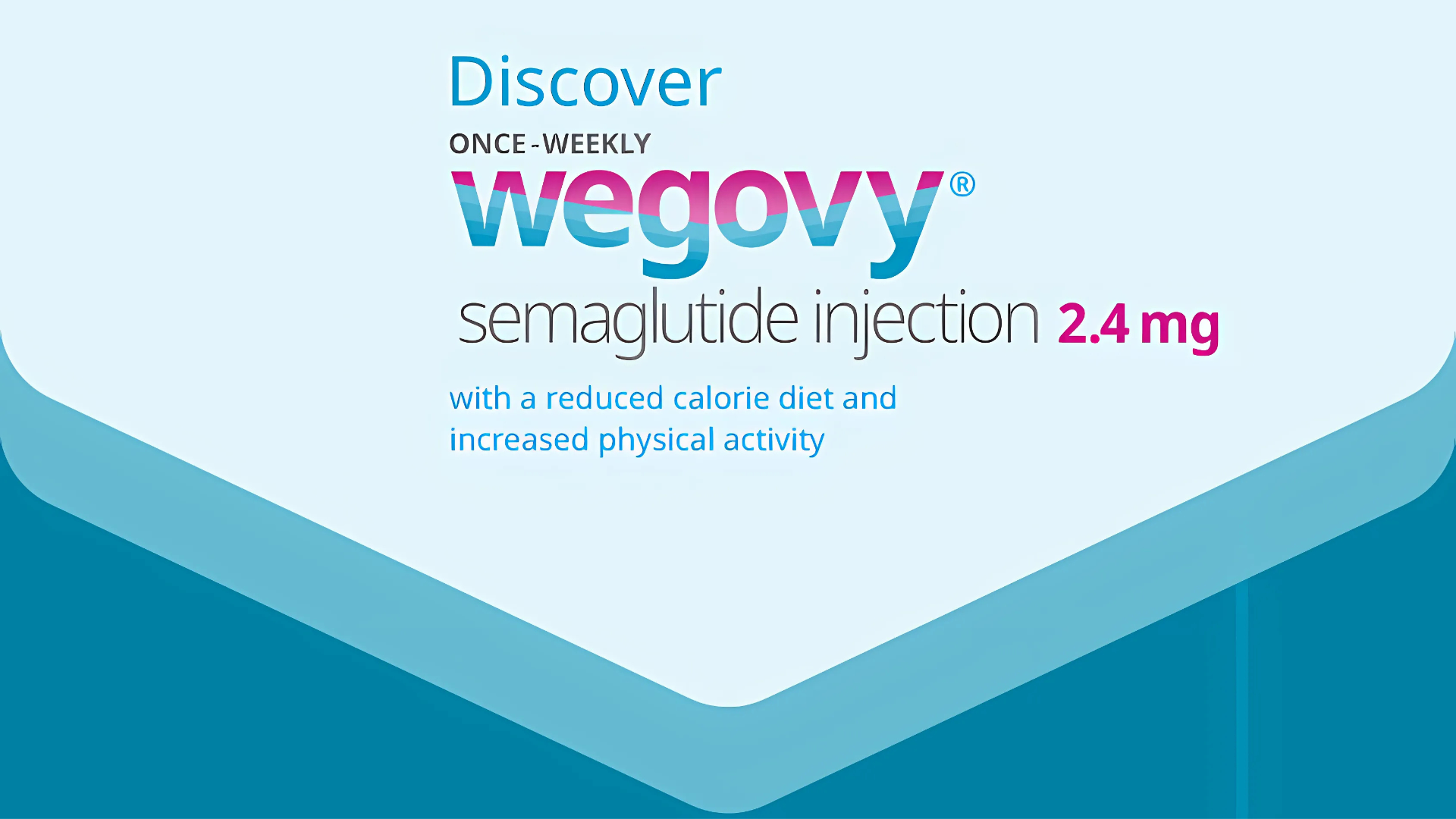
Maribeth Capuno
DNP, RN, ANP-BC
Location : Richmond, VA, USA
BIO
Maribeth Capuno obtained her Master of Science in Nursing from Emory University in 1996. She was then certified as an Adult Nurse Practitioner. She worked as a Nurse Practitioner in Cardiology for over 20 years, specializing in Heart Failure. In 2019, she advanced her education by obtaining her Doctor of Nursing Practice from the University of Virginia. In 2021, she relocated to Richmond Virginia and took a position in the Hepatology department at the Richmond Veteran's Affairs Medical Center. In this position, her focus has been on patients with MASLD/MASH throughout the spectrum of their disease. She works with her patients to develop an individualized plan of care to assist them in controlling their metabolic conditions which are contributing to their liver disease. She also is a Sub-Investigator on multiple MASLD/MASH clinical trials.
MASLD-MASH Content Featuring Maribeth
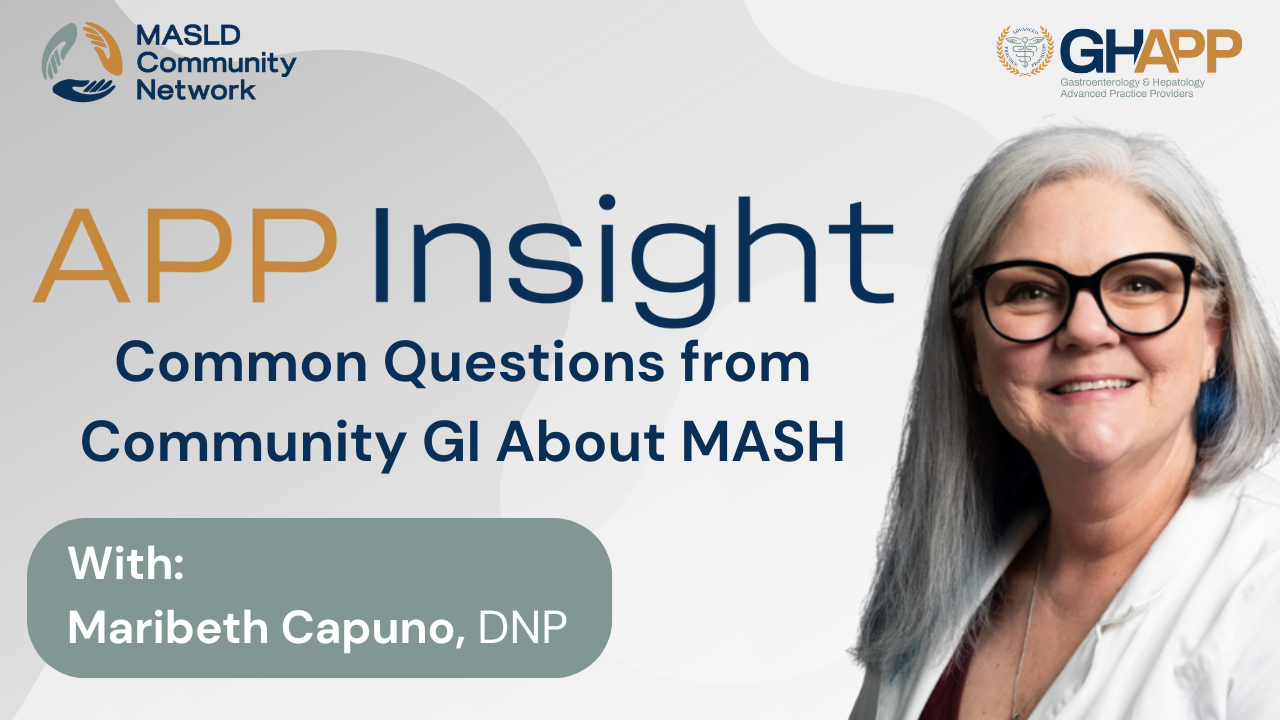
Common Questions From Community GI About MASH With Maribeth Capuno

In this educational session, Maribeth Capuno, Adult Nurse Practitioner specializing in hepatology at the Richmond VA Medical Center, answers two of the most common questions clinicians face about Metabolic Associated Steatotic Liver Disease (MASLD) and Metabolic Associated Steatohepatitis (MASH). She explains how elevated liver enzymes—particularly when ALT is greater than AST—can be an early signal to investigate further, and why obtaining a baseline ultrasound and, when possible, a FibroScan are key steps in assessing liver health. Maribeth also covers how to determine the right time to repeat non-invasive liver testing, especially in patients with higher-risk metabolic conditions such as diabetes, and highlights the role of tests like Fib-4 and the ELF test in identifying fibrosis risk. Whether you’re a healthcare provider managing patients with liver disease or someone seeking to understand the latest non-invasive approaches to MASLD and MASH, this video provides practical guidance on monitoring, testing frequency, and risk assessment strategies that can improve patient care and outcomes.
Watch Now
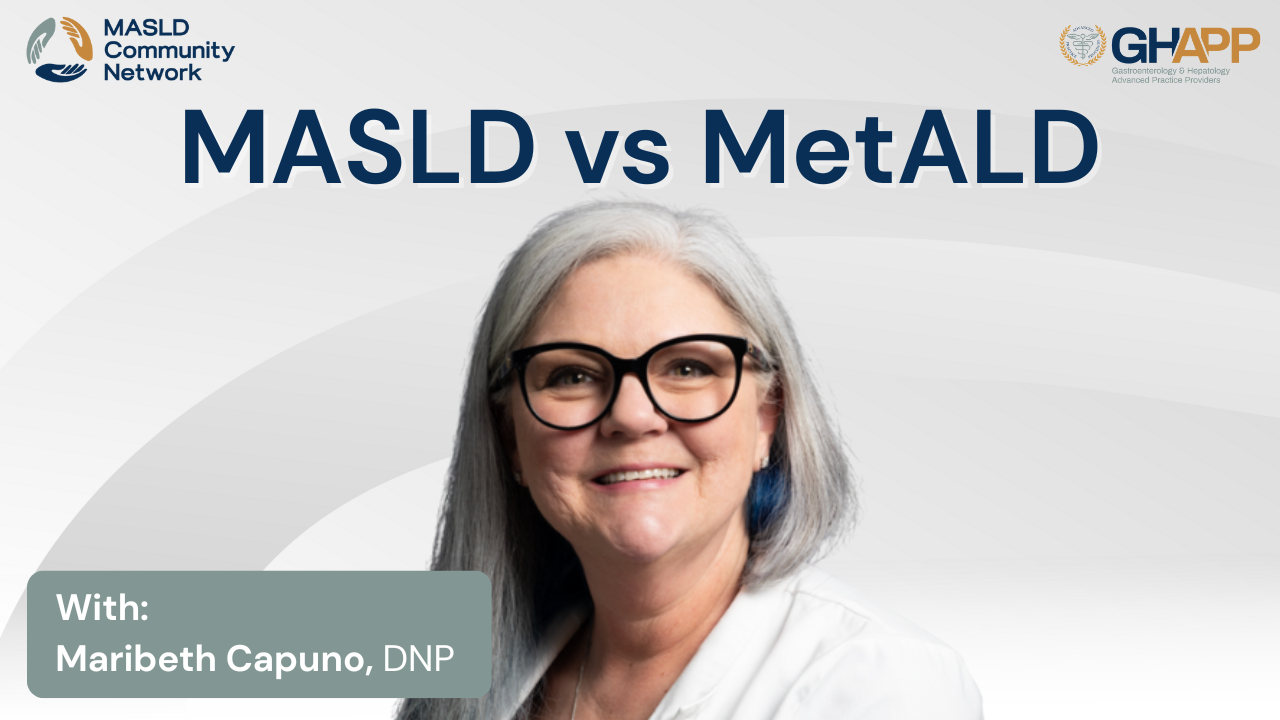
MASLD vs MetALD With Maribeth Capuno

In this case-based talk from the GHAPP MASLD Community Network, Maribeth Capuno, DNP reviews how to differentiate metabolic dysfunction–associated steatotic liver disease (MASLD) from metabolic dysfunction plus alcohol-associated liver disease (MetALD). Using a 52-year-old patient with ultrasound-confirmed steatosis, metabolic risks (PCOS, hypertension, hyperlipidemia, prediabetes), and daily wine intake, she walks through labs and noninvasive testing—FibroScan 11.4 kPa (F3 fibrosis) and CAP 310 (severe steatosis)—plus an objective PEth biomarker of 120 indicating moderate–heavy alcohol use. The session covers the SLD spectrum, “standard drink” counseling, why questionnaires (AUDIT) and biomarkers (PEth) uncover under-reported alcohol use, and how alcohol synergizes with insulin resistance and dyslipidemia to accelerate fibrosis and decompensation risk. Practical management includes Mediterranean-style nutrition, exercise with 5–10% weight-loss goals, strict alcohol cessation, medication considerations for advanced fibrosis, and HCC surveillance in F3 disease. Ideal for APPs and hepatology clinicians, this video delivers step-by-step evaluation, diagnostic criteria, and clear, patient-education talking points to improve MASLD/MetALD assessment and outcomes.
Watch Now
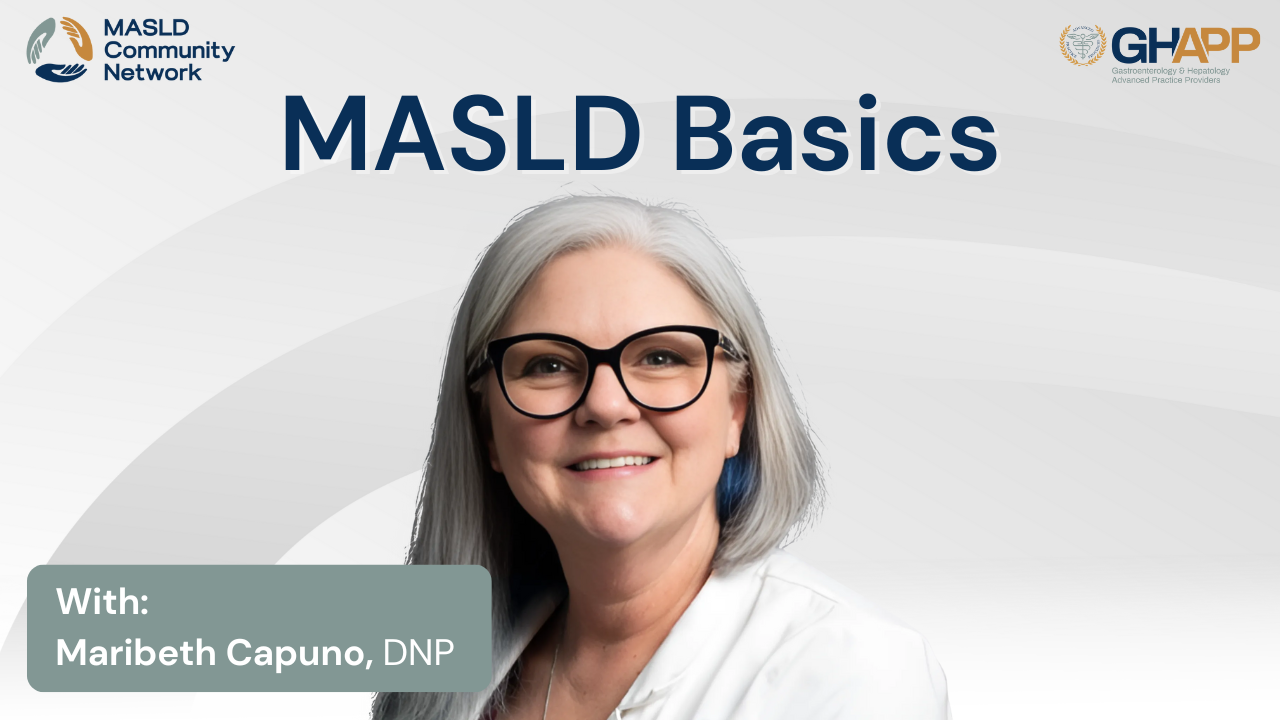
MASLD Basics With Maribeth Capuno

Join us for an in-depth overview of steatotic liver disease, presented through the GHAPP MASLD/MASH Community Network and proudly sponsored by Madrigal Pharmaceuticals. This engaging session walks through the updated terminology replacing NAFLD and NASH with MASLD (Metabolic Dysfunction-Associated Steatotic Liver Disease) and MASH (Metabolic Dysfunction-Associated Steatohepatitis)—explaining what the name change means and how to apply the latest AASLD 2023 guidelines in clinical practice. Learn how to identify MASLD based on cardiometabolic risk factors, rule out other causes of steatosis such as alcohol use, autoimmune conditions, and hereditary liver diseases, and determine when to use non-invasive testing like FIB-4, FibroScan, and ELF to stratify fibrosis risk. With Global Fatty Liver Day around the corner, this timely presentation also highlights the global burden of MASLD, its progression from steatosis to cirrhosis and HCC, and practical steps for primary care and hepatology teams to intervene early. You'll follow the case of JP, a 55-year-old with obesity, pre-diabetes, and elevated liver enzymes, as a real-world example of how to evaluate, diagnose, and manage MASLD—and when to refer to hepatology for advanced care. Whether you're a GI provider, APP, or primary care clinician, this talk offers a practical roadmap for managing fatty liver disease in 2025 and beyond.
Watch Now
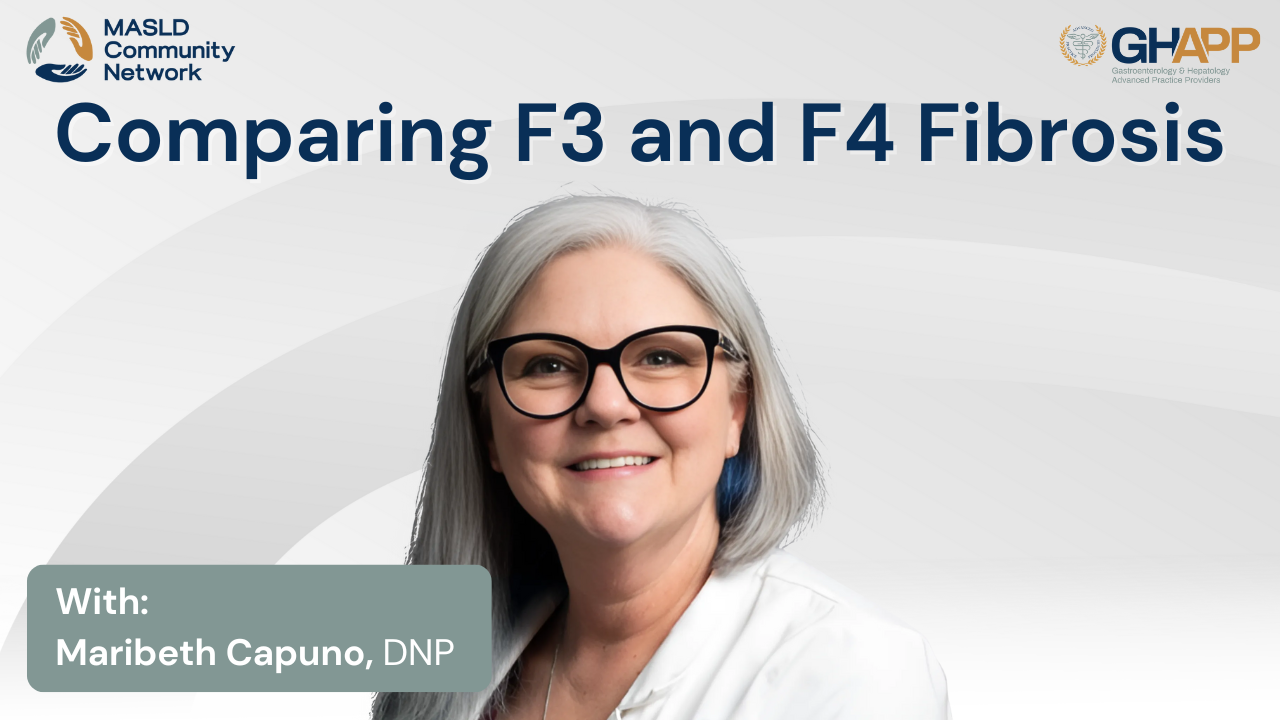
Comparing F3 and F4 Fibrosis With Maribeth Capuno

Join Maribeth Capuno, DNP, from the Richmond VA Medical Center, for an insightful case-based discussion on F3 vs. F4 fibrosis staging in patients with Metabolic Dysfunction-Associated Steatotic Liver Disease (MASLD) and MASH, presented through the GHAPP MASLD/MASH Community Network and sponsored by Madrigal Pharmaceuticals. Using the fictional case of “Sam,” Maribeth demonstrates how to differentiate between F3 and F4 fibrosis using non-invasive tools like FIB-4, FibroScan, and the ELF test, while explaining their respective cutoffs and clinical implications. Learn how to stage MASLD accurately, when to consider MRI elastography or liver biopsy, and how to initiate evidence-based management strategies including lifestyle modification, GLP-1 therapy, and the newly approved medication Resmetirom (Rezdiffra). The session highlights the importance of HCC surveillance, portal hypertension screening, and the nuances in monitoring between F3 and F4 fibrosis stages. With a strong emphasis on practical, guideline-aligned hepatology care, this video provides essential insights for clinicians managing the growing MASLD population.
Watch Now

HCC Surveillance: Implementation in Patients With Advanced Fibrosis/Cirrhosis From MASH

Learn when and how to effectively screen for hepatocellular carcinoma (HCC) in patients at risk, especially those with metabolic dysfunction-associated steatotic liver disease (MASLD). In this informative video, Maribeth Capuno, an adult nurse practitioner at the Richmond Veterans Affairs Medical Center, shares her clinical approach to early HCC surveillance. While AASLD guidelines recommend screening only after cirrhosis has been diagnosed, Maribeth highlights the growing evidence that patients with stage 3 fibrosis can still develop liver cancer—and why she begins surveillance earlier. She discusses the recommended tools, including liver ultrasound every six months and alpha-fetoprotein testing, and explores practical workflow tips to ensure patients remain adherent. Learn how imaging modalities like MRI and CT with liver protocol, along with tools like LI-RADS and tumor board consultations, contribute to timely and accurate diagnosis. The video also emphasizes key risk factors—such as obesity, diabetes, viral hepatitis, and lifestyle behaviors—and how managing these can help prevent the progression to HCC.
Watch Now

Management of Life Style Modification

This video focuses on the comprehensive management of patients with metabolic-associated steatohepatitis (MASH), emphasizing lifestyle modifications, dietary adjustments, and exercise strategies. Key topics include the importance of addressing risk factors like diet, exercise habits, and alcohol intake, as well as referrals to medically supervised weight loss clinics or bariatric surgery for advanced cases. The speaker highlights the benefits of the Mediterranean diet, intermittent fasting, and avoiding ultra-processed foods while discussing the role of resistance training to combat sarcopenia and maintain muscle mass. Practical advice and tailored recommendations ensure a holistic approach to managing MASH and improving patient outcomes.
Watch Now

Third Step of Life Style Management

This video provides a comprehensive overview of emerging pharmacologic treatments for metabolic-associated steatohepatitis (MASH) and their tailored applications based on patient profiles. Topics include FDA-approved therapies, drugs in advanced clinical trials (such as semaglutide and lanifibranor), and the potential for combination treatments targeting both steatohepatitis and fibrosis. The speaker emphasizes the importance of patient-specific approaches considering metabolic profiles, obesity, and diabetes status, alongside lifestyle interventions. Additionally, the video discusses the evolving interdisciplinary care model and highlights the exciting progress in non-invasive testing and treatment advancements for F2-F3 fibrosis.
Watch Now

Approved Medication for MASH/NASH

This video provides detailed guidance on selecting and monitoring patients for emerging therapies targeting advanced fibrosis (F2-F3) in NASH. Key topics include contraindications for patients with cirrhosis, considerations for concomitant medications, and dose adjustments for statins. The video outlines ideal candidates based on specific thresholds for VCTE, MRE, ELF scores, and other non-invasive tests while emphasizing the importance of ruling out portal hypertension and other liver diseases. It also reviews a stepwise monitoring approach, focusing on tolerability at three months and efficacy assessments at six and twelve months, with an emphasis on histologic and non-invasive test improvements.
Watch Now

Types of Diet for the Treatment of MASLD

This video explores comprehensive strategies for managing metabolic-associated steatohepatitis (MASH), focusing on fibrosis risk stratification, lifestyle modifications, and pharmacologic interventions. Learn about dietary recommendations like the Mediterranean diet, exercise guidelines emphasizing resistance training, and the role of intermittent fasting and processed food avoidance. The video also highlights weight loss targets, diabetes management, and emerging therapies such as GLP-1 receptor agonists and bariatric surgery, all aimed at improving liver health and patient outcomes.
Watch Now

NITs to Identify High Risk MASH Patients

Explore advancements in non-invasive diagnostics and risk stratification for liver fibrosis and MASH. This video highlights tools like FIB-4, transient elastography, and innovative scoring systems (e.g., FAST and Agile) to identify and predict outcomes for high-risk patients. Learn about serum biomarkers, updated guidelines, and the role of lifestyle interventions alongside targeted therapies for managing metabolic risks and advancing care in hepatology.
Watch Now












